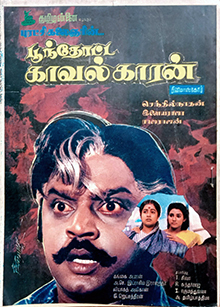Poonthotta Kaavalkaaran (transl. The guard of the flower garden) is a 1988 Indian Tamil-language action drama film directed by Senthilnathan, in his directorial debut. The film stars Vijayakanth, Radhika, Anand, Vani Viswanath and Livingston. It was released on 10 June 1988,[1] and ran for over 175 days in theatres.[2] The film was remade in Telugu as Dharma Teja (1988).[citation needed]
| Poonthotta Kaavalkaaran | |
|---|---|
 Poster | |
| Directed by | Senthilnathan |
| Screenplay by | Liaquat Ali Khan |
| Story by | A. S. Ibrahim Rowther |
| Produced by | T. Siva R. Sundar Raj I. Rahumathulla Tamil Fathima |
| Starring | Vijayakanth Radhika Anand Vani Viswanath Livingston |
| Cinematography | Rajarajan |
| Edited by | G. Jayachandran |
| Music by | Ilaiyaraaja |
Production company | Tamilannai Cine Creation |
Release date |
|
Running time | 139 minutes |
| Country | India |
| Language | Tamil |
Plot
editThis article needs an improved plot summary. (September 2022) |
Like a gardener nurturing his flowers with tenderness, an elderly vigilante takes under his wing a young couple of runaway lovers, showering them with love and protection. The father of the young woman, however, seeks to eliminate her lover, who happens to be the sworn enemy of the law enforcer. It is this enemy who caused the tragic loss of the hero's only heir, rendering his wife unable to bear children. As horrific memories resurface, the old law enforcer gears up for a final confrontation.
Cast
edit- Vijayakanth as Anthony
- Radhika as Sivagami
- Anand as Anand
- Vani Viswanath as Vidhya
- Livingston as Ramkumar
- S. S. Chandran as M.L.A.
- Pandiyan as Muthu Batcha
- M. N. Nambiar as D.S.P.
- Malaysia Vasudevan as Sivagami's father (guest appearance)
- Thyagu as Ramkumar's assistant
- Senthil as Azhagu (guest appearance)
- S. N. Lakshmi as Anand's grandma
- Kullamani
- K. S. Jayalakshmi
- Vijay Krishnaraj as Minister
- Kokila as Susheela
Production
editSenthilnathan, son of Jambulingam who directed Nam Naadu with M. G. Ramachandran and erstwhile assistant of S. A. Chandrasekhar and V. Azhagappan made his directorial debut with this film.[3] Vijayakanth offered Livingston a negative role in the film, and he accepted.[4]
Soundtrack
editThe music was composed by Ilaiyaraaja, with lyrics by Gangai Amaran.[5][6] The song "Sindhiya Venmani" song is set to the Carnatic raga Srothaswini,[7] and "Paramal Partha Nenjam" is set to Suddha Dhanyasi.[8]
| Song | Singers | Length | Lyricist |
|---|---|---|---|
| "En Uyire Vaa" | S. P. Balasubrahmanyam, K. S. Chithra | 04:31 | Gangai Amaran |
| "Adi Kaana Karunkuyile" | K. J. Yesudas | 05:35 | Gangai Amaran |
| "Kavalkara Kavalkara" | Ilaiyaraaja | 04:07 | Gangai Amaran |
| "Paadatha Themmangu" | S. P. Balasubrahmanyam | 05:32 | Gangai Amaran |
| "Paramal Paartha Nenjam" | Mano, K. S. Chithra | 04:26 | Gangai Amaran |
| "Sindhiya Venmani" | K. J. Yesudas, P. Susheela | 04:22 | Gangai Amaran |
| "Ezhaigal Vaazha Nee" | Ilaiyaraaja | 01:02 | Gangai Amaran |
Reception
editJayamanmadhan (a duo) of Kalki praised Livingston's performance but felt his character design as antagonist was not strong enough while also praising Chandran's humour and Ilaiyaraaja's music but panned the flashback of Vani and Anand as lengthy and dragged. They also felt the inclusion of stunt sequences in an emotional film was like neither here and nor there.[9]
Accolades
editRadhika won the Cinema Express Award for Best Actress – Tamil, and Livingston won for Best New Face.[10]
References
edit- ^ "நட்சத்திர படப் பட்டியல்". Cinema Express (in Tamil). 1 December 2002. pp. 41–43. Archived from the original on 2 February 2024. Retrieved 2 February 2024.
- ^ Selvaraj, N. (20 March 2017). "வெள்ளி விழா கண்ட தமிழ் திரைப்படங்கள்" [Tamil films that completed silver jubilees]. Thinnai (in Tamil). Archived from the original on 29 March 2017. Retrieved 11 April 2023.
- ^ Sai Sachin Shibu (1 August 2011). Director Senthilnathan Captain TV – Part 1 (in Tamil). Archived from the original on 11 April 2023. Retrieved 7 March 2015 – via YouTube.
- ^ "Interview with Livingstone | Worked his way to see success". Tamil Star. Archived from the original on 15 January 2000. Retrieved 15 May 2023.
- ^ "Poonthotta Kaavalkaaran Tamil Film LP Vinyl Record by Ilayaraja". Mossymart. Archived from the original on 28 October 2021. Retrieved 28 October 2021.
- ^ "Poonthotta Kavalkaran (1988)". Raaga.com. Archived from the original on 20 December 2013. Retrieved 8 January 2013.
- ^ Sundararaman 2007, p. 158.
- ^ Sundararaman 2007, p. 152.
- ^ ஜெயமன்மதன் (3 July 1988). "பூந்தோட்டக் காவல்காரன்". Kalki (in Tamil). p. 39. Archived from the original on 11 April 2023. Retrieved 12 April 2024 – via Internet Archive.
- ^ "Cinema Express readers choose Agni Nakshathiram". The Indian Express. Express News Service. 11 March 1989. p. 4. Retrieved 19 February 2021 – via Google News Archive.